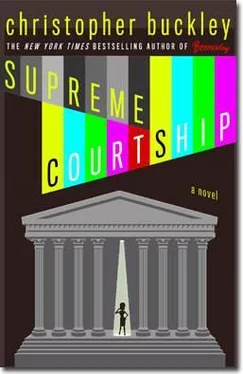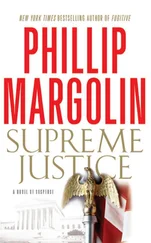“Oh, he’s a big boy. It’s not him I’m worried about,” Paige said.
“All right,” Pepper said. “Let’s have it. You think I voted wrong?”
Paige had voted against Swayle. “It’s not that. But I had the feeling back there that you were voting against your instincts.”
“It’s not about instincts, is it?” Pepper said. “It’s about the law. Right?”
“Are you trying to convince me, or yourself?”
Paige stood to go. “Sandy O’Connor kept a needlepoint cushion in her chambers. It said, ‘Maybe in error. Never in doubt.’ ” She smiled. “I look forward to reading your opinion. Good luck with it.”
MR. PRESIDENT. We’ve just intercepted a coded signal from Chinese Naval Command Shanghai.”
“Go ahead, Admiral.”
“The Wung Fu, their fast frigate-it’s armed with specials. Nuclear-tipped missiles.”
The President’s face darkened. “Goddammit. They lied. Their premier looked me straight in the face. And lied.” He slammed his fist on the Situation Room table.
The Secretary of State said, “Sir, we don’t know that for an absolute fact. All we know for sure is that when you met with him, Li Pu Fang was making moves to consolidate his power base with Xiang Zhu.”
“Goddammit, Brad-he lied. What the hell kind of proof do you need? A mushroom cloud over San Francisco?”
The room fell silent. All eyes turned to the President.
“All right,” said the President. “No more Mr. Nice Guy. Send in the Nimitz. Maybe a carrier battle group will get their attention.”
The Chairman of the Joint Chiefs and the Secretary of Defense exchanged fraught glances.
“Sir,” said the Admiral, “they’ll take that as a provocation.”
“You having a hard time with the English language today, sailor? I gave you an order.”
“Aye, sir,” the Chairman replied. He nodded to his chief of operations and said gravely, “You heard the President. Send in the Nimitz.”
The Secretary of State said, “Sir, I beg you. This could lead to-global annihilation.”
“You had your chance, Brad. I’m sorry. Better pull your people out of Beijing.”
“But-there’s no time!”
“Then they’ll have themselves a ringside seat at the barbecue. Sorry, Brad, but this is my call.”
“One more day, Mr. President. Give us just one more day.”
The President shook his head. “I told those little yellow bastards not to-”
“Cut.”
President Mitchell Lovestorm turned to the director. “What’s the matter? I thought we were doing fine.”
The director, a man named Jerry, said, “It’s going great, Senator. Terrific. The line is ‘I told those bastards,’ not ‘I told those little yellow bastards.’ Okay? Let’s take it from-”
Dexter said, “I think it’s better my way. Tougher…”
“You could be right,” Jerry said. “But let’s trust the material.”
“That’s how they talk in Washington. Behind closed doors, anyway. Trust me. I’ve been in the room.”
Jerry nodded. “I don’t doubt it. But-”
“We want this to be realistic, right?”
“Absolutely. But let’s trust the script. Okay? All set…”
“I mean,” Dexter persisted, “they’re threatening the United States with nuclear weapons. You think in the Situation Room at the White House everyone’s going to stop and go, ‘Oh, gosh, oh, dear me,’ because the President, in a moment of-justifiable-stress, calls them a name? I don’t think so.”
Jerry glanced over at Buddy, who was perched in his producer’s chair, looking as though he were conducting an silent one-man Socratic dialogue on the ethics of racist epithets.
“Samsung is a sponsor,” Buddy said softy. “ Toyota is a sponsor. Will they be comfortable with ‘little yellow bastards’? I’m guessing not. I could be wrong.”
“Those are Korean and Japanese,” Dexter said. “They hate the Chinese. Are you kidding? They’ll lap it up.”
“It’s tempting, but let’s save it for season two.”
The makeup lady dabbed at Dexter’s forehead. He said poutingly, “I thought the whole idea was to be edgy.”
“Edgy? You’ve just ordered in the Nimitz. Three pages from now, you’re going to send a B-2 bomber over Shanghai, giving one point three billion little yellow bastards a case of the shits. I call that edgy. So, we good to go? I’d love to wrap the scene where you tell the Speaker of the House to fuck off before we break for lunch.”
“All right. Where do we-what’s the line?”
The script assistant said mechanically, “ ‘I told those bastards not to screw around. Now they are going to get a taste of their own cooking, and it will make hot and sour soup taste like Cream of Wheat.’ ”
“Okay, everyone. Places. Scene six, take four. Action…”
Dexter managed to get to the end of the scene without further denigrating one-seventh of the human race. He was doing better than credible work as President Mitchell Lovestorm, especially for a nonprofessional actor. Buddy’s casting instincts had not failed him: a senator who yearns to be president brings verisimilitude to the role.
Buddy had been screening the first three episodes of POTUS for the media, and indications were favorable. They were amused by its camp aspect. In the opening episode, Mitchell Lovestorm-at the time, vice president-is reluctantly thrust into history’s spotlight when the President is accidentally killed by a foul ball during opening day. His wife, Consuela “Connie” Lovestorm, played by the steamy Ramona Alvilar, is a panther in pantsuit who will stop at nothing to advance her husband’s fortunes, but who is unable to deny-much less control-her ardor for National Security adviser Milton Swan. Icy blue-eyed Gore Peckermann of the TV show St. Paul Trauma brought a cool ambivalence to his role as the former Navy SEAL turned National Security adviser, who must balance his loyalty to President Lovestorm and the country with his burning desire to throw the First Lady over his desk and brief her until dawn.
Pepper was in a sweat. She had an opinion to write, and since it proclaimed the right of criminals to sue gun manufacturers when their holdup weapons misfire in the middle of a crime, it needed to be good. Really, really good.
Her clerk, Sandoval, had offered to do “a draft” of it for her. Some justices let their clerks do pretty much all the “drafting” of their written opinions. But Pepper was determined to do her own even if it meant pulling all-nighters. She’d had enough problems in the media already without reading a snippy item in the Washington Post about how Judge Lightweight was relying on her clerks to do her heavy lifting. She didn’t doubt Sandoval’s discretion or loyalty, but clerks were a gossipy bunch who these days talked to reporters and authors and sometimes even wrote their own clerk-and-tell books.
After ten p.m. on what was shaping up to be her second sleepless night, Pepper was at her desk trying to figure out how to make the Swayle opinion sound like something Moses left behind on Mount Sinai along with the commandments. There was a knock on the door and in walked Justice Ishiguro “Mike” Haro.
“Busy?” he said.
It was a curious statement to make to someone who was in her office after ten p.m., looking like hell while staring desperately at a computer screen.
“Kind of. I’m working on the Swayle opinion,” Pepper said. “It’s been a while since I…”
“That’s why I came by.”
“Oh? How’s that?”
“Thought you could use some help.”
This struck Pepper as falling somewhere between a breach of etiquette and an outright insult. Though new here, she was pretty certain justices didn’t go around offering to help each other write opinions.
Читать дальше











